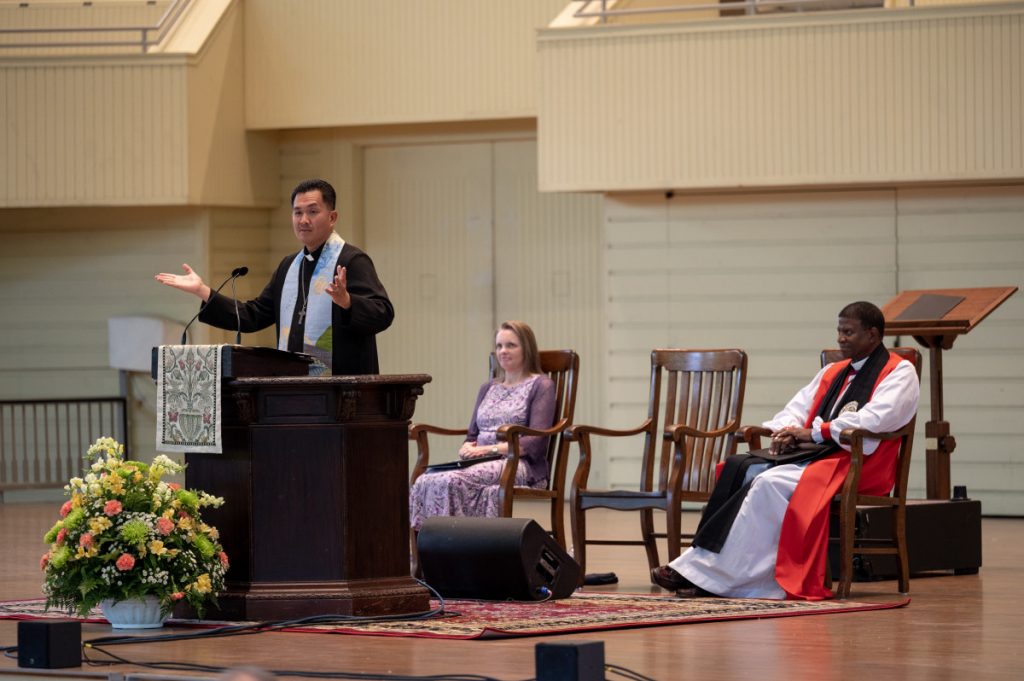
“Sticks and stones do break bones; words do hurt and curse or bless and heal,” said the Rev. Neal D. Presa. “We need silence to reflect on who we are and whose we are. Psalm 67 is about silence.”
He preached at the 9:15 a.m. morning worship service in the Amphitheater. The title of his sermon was “Selah.” The scripture reading was Psalm 67. He led the congregation in singing.
“Up above my head / (Up above my head) / I hear music in the air / (I hear music in the air) / And I really do believe / (Yeah) I really do believe / There’s a Heaven somewhere / (There’s a Heaven somewhere).”
Presa said, “The psalmist sings to quiet the soul, like ‘Hush little baby, don’t say a word. Papa’s gonna buy you a mockingbird. And if that mockingbird can’t sing, Papa’s gonna buy you a diamond ring.’ ”
The word “selah” is an ancient worship rubric that calls people to silence in order to meditate on God’s word and promises. In Psalm 67, the word “selah” appears twice, splitting the psalm into three sections.
In the first section, the psalmist asks God to be gracious and invites the people into prayer, into hope. The psalmist asks God to confer a blessing on the people and the use of “selah” calls them into silence so they can pray.
In the second section, the psalmist asks God to bless the worshippers so that the earth would know that God is God. “The late pastor and theologian Tim Keller said: ‘The enjoyment of God leads to mission, to shared and embodied faith,’ ” Presa said. “In silence, we can meditate on how we might share, we might serve, we might embody faith.”
In the third section, the psalmist calls the worshippers to praise God so that in the silence they will have hope in order to give honor and praise to God for what will be.
“The word ‘selah‘ is a disruption. My friend Rodger Nishioka, pastor at Prairie Village Presbyterian Church, says a disruption stops our action, and when we resume we are changed,” Presa said. “When we come to Chautauqua, it is a disruption of life; we are changed and transformed. ‘Selahs’ are holy disruptions calling us to pray, serve and hope.”
Presa asked the congregation, “How is God nudging you to pray, serve and hope? How is God disrupting you? How might you pray, serve and live in hope to share God’s blessing with others?”
What people pray, share and hope is the true reality; even though the vision is so far removed from their daily lives, the vision feels like wishful thinking. Justin Welby, the Archbishop of Canterbury, has said when learning more about the world that faith creates, we move into a new landscape and a new set of relationships.
“ ‘Selah’ is a disruption that helps us to see, sense, and relate differently,” Presa said. “We engage the world as blessed people who pray, serve and hope. Unlike Elizabeth Gilbert’s book, Eat, Pray, Love, we eat, pray and love with cosmic consequences.”
The world is already blessed, he said. “God claims all of us; we are already blessed. So let’s quit the power games, the corporate takeovers, the one-upmanship, the pride, gluttony, greed. Stop being a jerk to your spouse and co-workers. Stop being racist, misogynist. Just quit; we are already blessed.”
Presa continued, “God is gracious to us, so be kind, generous, peacemakers, agents of justice. God is good to all of us. We don’t get it or perceive it if we don’t, won’t, can’t. Selah.”
The Rt. Rev. Eugene Taylor Sutton, senior pastor for Chautauqua Institution, presided. The Rev. Natalie Hanson, co-pastor of Hurlbut Memorial Community Church, read the scriptures. The prelude was “Adagio,” from Sonata No. 1 by Felix Mendelssohn, played by Joshua Stafford, director of sacred music and Jared Jacobsen Chair for the Organist. The Motet Choir sang ”Write Your Blessed Name,” music by K. Lee Scott and words by Thoms à Kempis, translated by S. Kettlewell. Stafford directed the choir and Nicholas Stigall, organ scholar, accompanied them on the Massey Memorial Organ. Stafford played the postlude, “Allegro assai vivace,” from Mendelssohn’s Sonata No. 1. Support for this week’s chaplaincy and preaching is provided by the Edmond E. Robb-Walter C. Shaw Fund and the Randall-Hall Memorial Chaplaincy.




